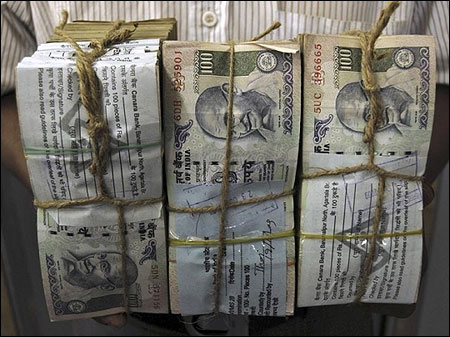Vrishti Beniwal in New Delhi
It has been a month since the Budget was tabled in Parliament, but the controversy involving the finance ministry's international tax proposals is refusing to die down.
Starting with the proposed retrospective amendment to Section 9 of the Income Tax Act, seen as a move to get over the adverse Supreme Court verdict on Vodafone, the controversy spilled over to taxation of foreign portfolio investments and taxation of foreign assets of Indians.
While the industry fears the proposals are retrograde and would bring back 'inspector raj' by giving draconian powers to tax officials, the ministry has been trying hard to justify its move.
. . .
Why investors are restive at Budget tax proposals
Image: A trader speaks on phones while trading at a stock brokerage in Mumbai.Photographs: Arko Datta/Reuters
Its officials have provided several clarifications to allay the fears of foreign investors, including foreign institutional investors, who are threatening to pull out from India if the proposals are not revisited while passing the Finance Bill.
The issue that grappled the government immediately after the Budget was presented and saw intervention from Britain at a political level was the 'Vodafone amendment'.
The ministry said retrospective amendments were not uncommon and many, including the UK and China, had used the tool.
There are concerns that cases similar to the Vodafone deal may be re-opened and taxed.
. . .
Why investors are restive at Budget tax proposals
Image: A dealer reacts while trading at a stock brokerage firm in Kolkata.Photographs: Parth Sanyal/Reuters
The ministry officials say cases beyond six years won't be re-opened but those at various stages of litigation in various courts or where the court has already ruled in favour of a company may come under a tax scanner because of the introduction of a validation clause.
The move has started yielding results, with at least one company keeping aside an amount equal to the estimated tax on their buyout of Indian assets, even if the deal was with a company based abroad.
MS&AD Insurance Group of Japan said it would withhold the tax amount while buying 26 per cent stake in Max New York Life Insurance for Rs 2,731 crore (Rs 27.31 billion).
. . .
Why investors are restive at Budget tax proposals
Though New York Life Insurance Company, which sold the shares, said the deal should not be subject to tax in India, as it held the shares in the life insurance joint venture with Max India through a holding company in Mauritius, it allowed the Japanese company to withhold the tax as a precaution; it would file for a refund later.
GAAR
The biggest concern of foreign investors at this juncture is the government's proposal to introduce a General Anti-Avoidance Rule.
Investors, who had several rounds of meeting with finance ministry officials, argued no other country taxes foreign portfolio investment in its stock markets.
. . .
Why investors are restive at Budget tax proposals
Image: A bank employee counts currency notes at a cash counter in Agartala.Photographs: Jayanta Dey/Reuters
The ministry clarified it wouldn't go after Participatory-note holders but did not give any assurance on tax benefits to FIIs who had not paid tax in any other country.
"This effectively means the post-tax return of P-note holders would come down if the profits of FIIs are taxed," an expert said.
With this move, the finance ministry has almost closed the Mauritius route for companies routing their investments into India through the island nation to obtain tax benefits.
Officials in the ministry are not willing to buy the argument that this would severely hit FII investment in India.
Their view is that the decision to invest in a country is driven by far more important factors such as the fundamentals of an economy.
. . .
Why investors are restive at Budget tax proposals
Once that call is made, investors go for the most economically viable route available.
"We are confident that investments would still come to India even if the Mauritius route is closed because there is no other market which could give good returns in the current global climate," a ministry official said.
Perhaps, it is this confidence, along with a widening fiscal deficit, that the ministry has so far stuck to its proposals despite vehement criticism from various quarters.
Under GAAR, it has also made provision for a treaty override to ensure 'impermissible arrangements' don't escape the tax net.
. . .
Why investors are restive at Budget tax proposals
Image: A broker monitors share prices at a brokerage firm in Mumbai.Photographs: Stringer/Reuters
Experts argue most countries keep this as the last resort.
India may have introduced the provision to address gaps in treaties with tax havens like Mauritius.
It has been for long trying to renegotiate the treaty but a favourable outcome did not seem imminent.
Another worry of investors is under GAAR, the onus would be on the taxpayer to prove the main purpose of an arrangement is not tax avoidance.
The tax officer would also have to prove the tax structure was impermissible, but the evidence to prove can come only from the investor's side, the ministry argued. It assured there would be adequate safeguards in GAAR once rules are notified.
. . .
Why investors are restive at Budget tax proposals
Image: Stock brokers engage in trading in Mumbai.Photographs: Arko Datta/Reuters
Another Budget proposal, of re-opening assessment cases for the past 16 years, against six years at present, has made people with foreign assets jittery.
Tax officials said genuine investors need not worry, as an assessing officer would need some evidence and approval from higher authorities to re-open a case.
The ministry has been accused of giving too much power to its tax officers in this Budget.
Industry fears these can be misused to harass taxpayers.










article